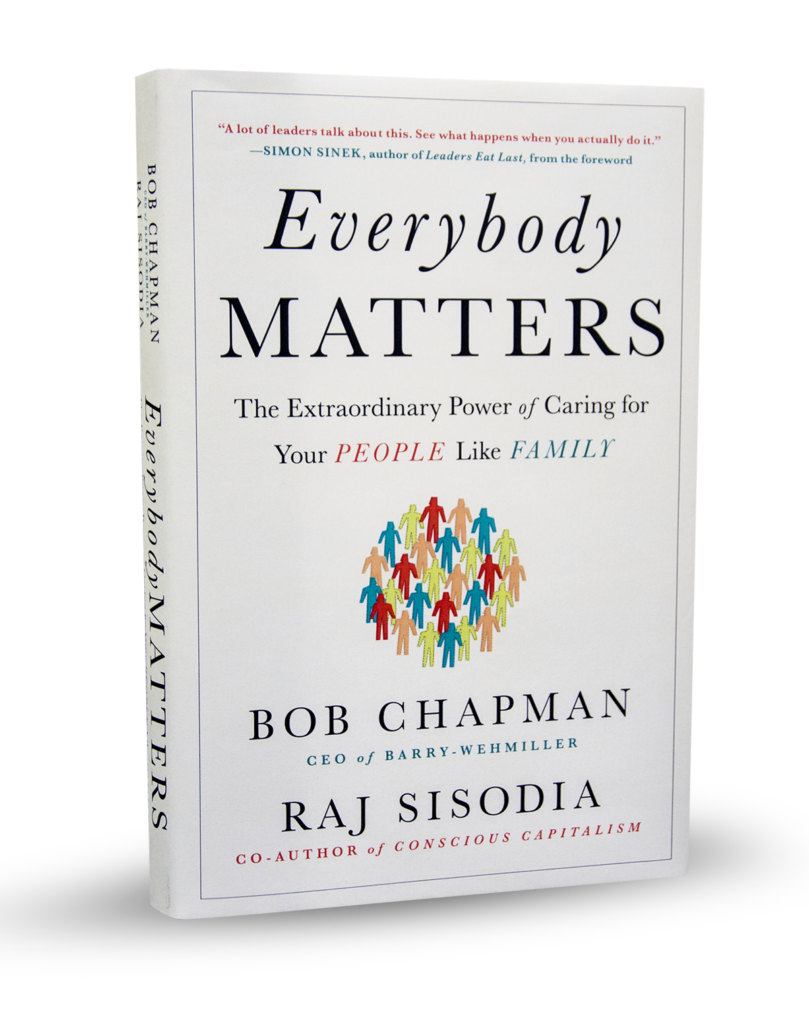Everybody Matters (The Extraordinary Power of Caring for Your People Like Family)

By: Bob Chapman, CEO of Barry-Wehmiller and Raj Sisodia, coauthor of Conscious Capitalism
Published by Portfolio/Penguin, New York, New York | Copyright 2015
Author: Evelyn Neis
If you are getting ready to become an entrepreneur, have recently started a business, represent leadership in an existing business- large or small, this book is full of practical suggestions and wisdom on how to grow and maintain a thriving organization.
If you are an employee participant of any of the above-listed types of organizations, this book provides practical information and wisdom on how you may be able to improve your role within the operation or help you decide if it’s time to consider moving on in order to find a position that more closely aligns with your career goals and desired work environment.
Barry-Wehmiller was founded in 1885 and is still thriving today. In 2015, the company had revenues of $2.4B with 11,000 employees and 11 subsidiaries and it is still growing. The journey from then to now was not easy and required a change in the definition of leadership and a cultural change incorporating the human side of business. To quote the authors, “Business can be the primary vehicle for building a better world if we appropriately respect and care for people. Business is far more than a profit machine.”
Thomas J. Barry started his business in 1885 by making conveying and transportation equipment for malt houses in St. Louis. Alfred Wehmiller joined his brother-in-law in the business and invented the pasteurization machine for Anheuser-Busch. One can imagine that within the 133-year life of the company many business successes and struggles were experienced. Barry-Wehmiller started out as a family owned business. In 1953, they hired William Chapman as their treasurer and in 1957 the family sold the controlling interest in the business to him. Bob Chapman joined his father in the business in 1969. Bill Chapman died in 1975 and Bob became the CEO and Chairman of Board when he was 30 years old. Barry-Wehmiller had revenues of $18M, $2-$3M of debt, and negative operating income of $477,000 and about 400 employees and worked with 3 unions when Bob started to manage the company
The company continued to have good times and bad times including an almost need to declare bankruptcy in 1983. In order to create a more secure future, Bob decided to change their business strategy to one of Acquisitions. The company became very adept and had many successful acquisitions. Bob explained, “I viewed people as objects and functions. I was very finance oriented and totally focused on conventional measures of success: profits, money, and power. I did what I felt I had to do to make money: cut costs, lay people off, shut plants down without worrying about human consequences.” A major acquisition which took place in 1997 changed Bob Chapman’s outlook on the meaning of leadership. He writes about how he discovered and created his Guiding Principles of Leadership. He changed his view of the human consequences of business as well. He decided, “We measure success by the way we touch the lives of people.”
A formal document was created outlining the principles of leadership. The next steps outlined in the book provides an overview of how they implemented and took action items to assure the entire operation utilized these guidelines every day. To this day, Barry-Wehmiller is on a continual journey to make their vision a reality. Bob Chapman and Raj Sisodia explain how the company changed its definition of leadership and changed its entire culture. This cultural change helped the organization survive the recession of 2008 and 2009 without laying off any people. They achieved this by having all employees from the top down share in the sacrifices required to survive the downtown in business and revenue. The authors write about this experience in great detail in Chapter 6, The Test of Our Culture.
The authors wrote, “It doesn’t matter how long your business has been around or the challenges you face.” Barry-Wehmiller has been around since 1885 and did not undergo its transformation until over a century later. The great thing about business is that despite all the history, all the deeply embedded traditional dysfunctional management practices, and all the baggage of unhealthy relationships and corrosive cultures, it is possible at any moment in time to push the reset button, to embrace a different way of being, and experience a dramatic change.
See more books from our resources library
